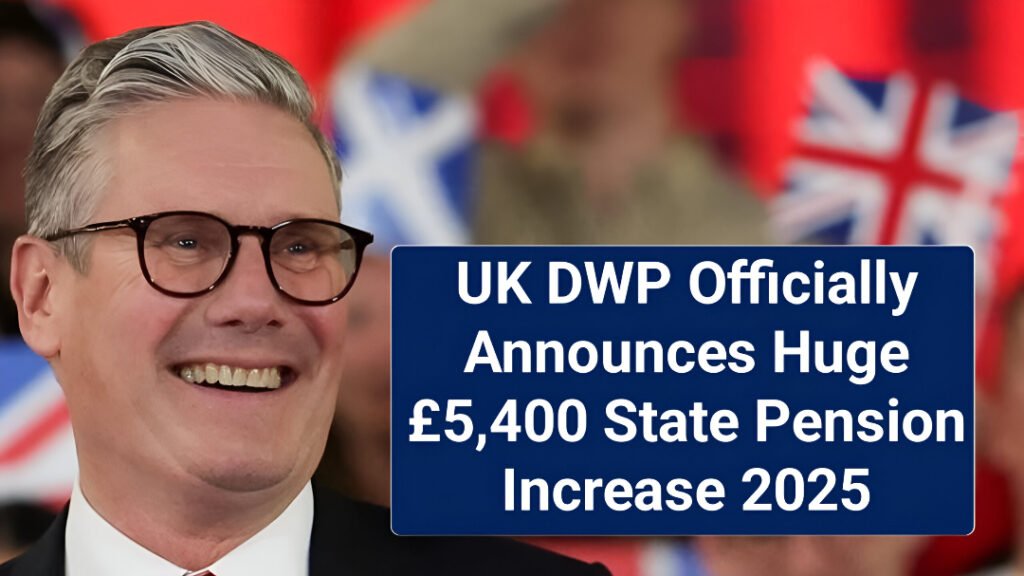Hello Everyone, The UK Government has delivered a major update for pensioners that could change the financial future of millions. The Department for Work and Pensions (DWP) has officially announced a £5,400 State Pension increase, marking one of the biggest changes in recent years. For retirees and those approaching retirement age, this is both exciting and crucial news.
This article will break down what the announcement means, who qualifies, how the new increase works, and what it means for the wider economy. We’ll also answer the most pressing questions UK citizens have about this historic pension change.
What Is the £5,400 State Pension Increase?
The DWP’s official announcement reveals that the State Pension is set to rise by £5,400 annually for those who qualify. This isn’t just a small adjustment; it’s a massive uplift that aims to help pensioners deal with rising costs of living, inflation, and long-term financial pressures.
Currently, the full new State Pension is £11,502 per year (2024/25 rates). With this increase, many pensioners could see their income boosted by nearly 50%, which is unprecedented in modern UK pension history.
Why Has the Government Approved This Rise?
The decision is rooted in several key challenges:
-
Inflation and cost of living pressures – Food, housing, and energy bills have been rising sharply.
-
Triple Lock policy commitments – The Government has promised to maintain the triple lock, ensuring pensions grow in line with inflation, average wages, or 2.5% (whichever is highest).
-
Support for pensioners on low incomes – The Government aims to reduce poverty among older citizens.
-
Demographic changes – With the UK’s ageing population, pensions are becoming central to long-term welfare planning.
By approving this increase, the Government signals a strong commitment to supporting older citizens financially.
Who Will Qualify for the £5,400 Increase?
Not every pensioner will automatically receive this rise. Qualification will depend on several factors:
-
Age: You must have reached State Pension age (currently 66, rising to 67 by 2028).
-
National Insurance Contributions: A minimum number of years (usually 35) of contributions is required to get the full State Pension.
-
Residency: Generally, you must live in the UK, but some pensioners living abroad may qualify depending on agreements.
-
Current Entitlement: Those already receiving the new State Pension will see the biggest changes.
If you receive the basic State Pension (pre-2016 rules), the increase will still apply but may be calculated differently.
How Will the Increase Be Paid?
The DWP has clarified that the increase will be rolled into weekly payments, just like the current State Pension system.
-
Current full weekly new State Pension: £221.20 per week
-
With the increase: Approx. £325 per week
Payments will continue to be made every four weeks, directly into pensioners’ bank accounts.
What About Pension Credit and Other Benefits?
For those who receive Pension Credit, Housing Benefit, or other income-based support, the rise in State Pension could affect entitlement. Some pensioners may see reductions in means-tested benefits because their income will be higher.
However, the Government has stated that safeguards will be in place to ensure that vulnerable pensioners do not lose out overall.
Wider Economic Impact of the Increase
This huge rise in pension spending will have ripple effects across the UK economy:
-
Government spending will rise by billions annually.
-
Pensioner spending power will increase, supporting local businesses.
-
Tax implications may come into play, as some pensioners could be pushed into higher income tax brackets.
-
Young taxpayers may be concerned about the affordability of such rises in the long term.
Despite these concerns, the Government argues that ensuring pensioners’ financial security is a priority.
How Pensioners Can Prepare for the Change
If you’re a UK pensioner, here are some practical steps:
-
Check your National Insurance record to ensure you qualify for the full pension.
-
Use the Government’s online pension forecast tool to see how much you will receive.
-
Seek advice from a financial advisor if you’re worried about tax implications.
-
Stay updated with official DWP announcements for exact payment dates.
Frequently Asked Questions (FAQs)
Q1: When will the £5,400 State Pension increase take effect?
The DWP has indicated that the increase will be applied from April 2025, in line with the new financial year.
Q2: Do all pensioners get the full £5,400 rise?
Not necessarily. The increase applies to the full State Pension amount. If you have incomplete National Insurance contributions, your rise may be proportionate.
Q3: Will the increase affect my Pension Credit eligibility?
Yes, higher income may affect Pension Credit. However, the Government has pledged safeguards for vulnerable pensioners.
Q4: Is the increase part of the Triple Lock system?
Yes, the rise is aligned with the triple lock guarantee, but it goes beyond usual annual adjustments due to exceptional circumstances.
Q5: Will overseas pensioners benefit from this rise?
Some pensioners living abroad will qualify if they reside in countries with reciprocal agreements (e.g., EU nations). Others may not.
Q6: Could this increase push me into paying tax?
Yes, if your total income exceeds the personal allowance (£12,570), you may need to pay income tax. This will be a new reality for many pensioners.
Q7: Where can I check official details about my pension?
You can visit the UK Government’s official State Pension page to see your forecast and eligibility.
Final Thoughts
The £5,400 State Pension increase is one of the boldest financial moves for UK pensioners in decades. While it brings huge relief to millions struggling with living costs, it also raises questions about affordability, tax implications, and long-term sustainability.
For now, pensioners can look forward to greater financial security from 2025 onwards. Staying informed and planning ahead will be crucial to making the most of this landmark pension boost.
